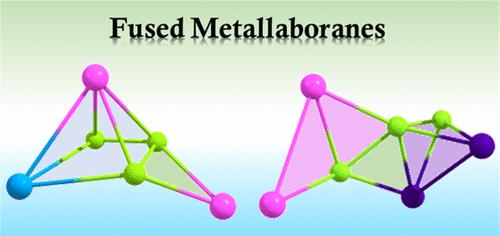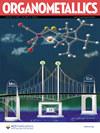Metal-Rich Fused Clusters: Syntheses, Structures, and Bonding of Heteronuclear Condensed Metallaboranes
IF 2.9
3区 化学
Q2 CHEMISTRY, INORGANIC & NUCLEAR
引用次数: 0
Abstract
Syntheses and structural elucidations of a series of condensed clusters are described. The condensation of nido-[(Cp*Ru)2(B3H9)], nido-1, with heavier group 7 metal carbonyl, [Re2(CO)10], yielded [(Cp*Ru)2(CO)B3H8{Re(CO)3}], 2. Ruthenaborane 2 is an edge-fused cluster of square pyramid {RuReB3} and triangle {RuB2} through a B–B bond. Further, the reaction of arachno-[(Cp*Ru)2(B3H8)(CS2H)], arachno-3, with [Co2(CO)8] led to the formation of condensed ruthenaboranes [(Cp*Ru)2B3H3S{Co3(CO)8}(SCH3)], 4, and [(Cp*Ru)2B3H4{Co2(CO)7}(SCH3)], 5. Cluster 4 comprises two tetrahedron {Co2RuB}, {Co2BS} and pentagonal pyramidal {Co2RuB3} cores, and cluster 5 consists of a butterfly {Ru2B2}, a triangle {CoB2}, and a tetrahedron {Co2B2}. Both clusters 4 and 5 do not follow Mingos’ fusion formalism for fused clusters and are unusual examples based on their composition. On the other hand, cluster 2 follows Mingos’ fusion formalism. All of the clusters have been characterized by 1H, 11B{1H}, 13C{1H} NMR spectroscopies, electrospray ionization (ESI) mass spectrometry, and infrared (IR) spectroscopy, and the solid-state structures were established by single-crystal X-ray diffraction analysis.

富金属融合簇:异核凝聚金属硼烷的合成、结构和结合
本文介绍了一系列缩合团簇的合成和结构阐释。尼多-[(Cp*Ru)2(B3H9)],即尼多-1,与较重的第 7 族金属羰基[Re2(CO)10]缩合生成了[(Cp*Ru)2(CO)B3H8{Re(CO)3}],即鲁钌硼烷 2。鲁钌硼烷 2 是一个由正方形金字塔{RuReB3}和三角形{RuB2}通过 B-B 键融合而成的边缘簇。此外,ahchno-[(Cp*Ru)2(B3H8)(CS2H)](ahchno-3)与[Co2(CO)8]反应生成了缩合钌硼烷[(Cp*Ru)2B3H3S{Co3(CO)8}(SCH3)](4)和[(Cp*Ru)2B3H4{Co2(CO)7}(SCH3)](5)。簇 4 由两个四面体{Co2RuB}、{Co2BS}和五边形金字塔{Co2RuB3}核组成,簇 5 由一个蝶形{Ru2B2}、一个三角形{CoB2}和一个四面体{Co2B2}组成。第 4 和第 5 个星团都没有遵循明戈斯的融合星团融合形式主义,从其组成来看是一个不寻常的例子。另一方面,星团 2 遵循了明戈斯的融合形式主义。所有这些团簇的特征都已通过 1H、11B{1H}、13C{1H}核磁共振光谱、电喷雾离子化(ESI)质谱和红外光谱对所有簇合物进行了表征,并通过单晶 X 射线衍射分析确定了它们的固态结构。
本文章由计算机程序翻译,如有差异,请以英文原文为准。
求助全文
约1分钟内获得全文
求助全文
来源期刊

Organometallics
化学-无机化学与核化学
CiteScore
5.60
自引率
7.10%
发文量
382
审稿时长
1.7 months
期刊介绍:
Organometallics is the flagship journal of organometallic chemistry and records progress in one of the most active fields of science, bridging organic and inorganic chemistry. The journal publishes Articles, Communications, Reviews, and Tutorials (instructional overviews) that depict research on the synthesis, structure, bonding, chemical reactivity, and reaction mechanisms for a variety of applications, including catalyst design and catalytic processes; main-group, transition-metal, and lanthanide and actinide metal chemistry; synthetic aspects of polymer science and materials science; and bioorganometallic chemistry.
 求助内容:
求助内容: 应助结果提醒方式:
应助结果提醒方式:


